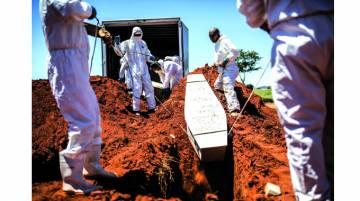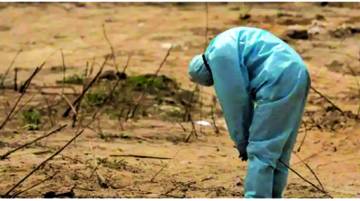
The Sunday Mail

Veronica Gwaze
Traditionalists agonise over forgoing rites
It is not uncommon for close relatives of the deceased to sit close to the coffin and bodies usually spend a night or some hours at home before burial, ostensibly to bid farewell to relatives.
However, new protocols and guidelines from the Ministry of Health and Child Care stipulate that Covid-19 bodies can only be moved from the mortuary or parlour straight to the burial site.
Body viewing or standing less than four metres from the coffin is now outlawed.
It is now mandatory for those transporting bodies for burial outside the city or town of death to ensure they are hermetically sealed in a triple coffin before collection of the body from the funeral parlour or hospital mortuary.
Restrictions on moving Covid-19 bodies, especially outside towns and cities, have connotations on traditional burial rites that have been observed since the beginning of time, traditionalists say.
Taboo
Some traditionalists believe that deviating from the norm could have consequences.
Chief Donald Kamba of Makoni chieftaincy believes obstruction of burial rites could cause challenges in future.
“Since time immemorial, it was taboo for families to bury their own, anywhere and everywhere,” said Chief Makoni.
“Some families established their own graveyards in rural communities to preserve ancestral ties, because in the African traditional religion, we believe people do not die but rest.”
Traditionalists said if one is not buried at their ancestral gravesite, their spirit will not find rest.
Chief Makoni maintains that despite the coronavirus scourge, which is forcing many to be buried away from these sites, some rituals can be conducted later to appease the “wandering” spirits.
Health experts say the extraordinary measures, which come with a great deal of inconvenience for the bereaved, are unavoidable.
“At a time like this, there is need to do all that is necessary to save lives, so after realising that some new cases are highly likely as a result of attending funerals or getting into contact with dead bodies, there was need to introduce stricter measures,” said Ministry of Health and Child Care director of environmental health Dr Victor Nyamande.
But, traditionalists such as Mbuya Calister Magorimbo, said some cultural norms should not be sacrificed.


“This is the first time I have come across such a situation and we have no choice . . .” she said.
There was, however, scope, she added, to remedy the situation once Covid-19 is eventually contained.
Madzibaba Stephen Mugari emphasised the need to forgo burial rites and stick to Government regulations to save lives.
“Tradition has become one of the drivers fuelling infections and loss of lives,” he said.
“Let us work towards fighting the outbreak and once it is over, everyone in their respective religions can conduct relevant rituals and correct the wrongs, just the same way rituals are being conducted for some liberation war heroes whose remains were lost in foreign lands.”
Islamists have also been forced by the coronavirus to abandon their rites.
Usually, bodies are washed and wrapped with pieces of cloth before burial.
Sheikh Ishmail Duwa, president of the Supreme Council of Islamic Affairs in Zimbabwe, said: “This is a matter of saving lives, so we cannot stick to some acts that we know can create more harm and danger for the nation.
“At this stage, we need collective efforts regardless of colour, creed or religion, because we are all exposed and this is pure science. Religion has to be cast aside.”
Myths
Psychologist Matthew Marava, a religious studies lecturer at a local college, believes some myths surrounding corpses are unfounded and border on assumptions crafted around social norms and values.
“Some of these myths are crafted from distortions of religious norms and superstitions. Most communities have manufactured a presumed reality,” he said.
“There should, however, be a well-balanced mixture of socio-cultural factors and scientific facts, especially in cases like the Covid-19 pandemic.
“Whatever future consequences that are believed to come, I think we . . . also need to be careful because the human brain has a tendency of creating a reality out of whatever it assumes to be true.”
Graveyards
There are fears the rising death toll could put pressure on limited burial space, particularly in cities.
Harare currently relies on a few cemeteries such as Zororo in Chitungwiza, Glen Forest Memorial Park and Granville Cemetery (Kumbudzi).
“These cemeteries are serving everyone, whether they die of Covid-19 or not,” reckons Mr Godfrey Mutuwere, Runyararo-Ukuthula Funeral Parlour communications officer.
He said at least 3 000 people are dying every day in the country.
“Spaces that have been earmarked for cemeteries will have to be urgently serviced to avoid inconveniences.”



